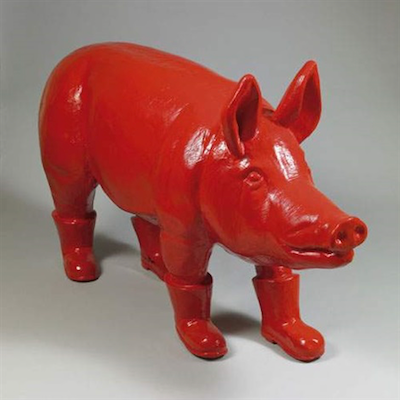
Details
Artist
Styles
Lithograph on paper // Joe Tilson’s Untitled (Symbols and Fragments) (1989) is a vibrant lithograph that assembles a grid of twelve colorful panels, each featuring distinct symbols, shapes, and textures. The artwork juxtaposes classical and natural imagery, such as a profile of a bearded figure evocative of ancient Greek art, with modern abstract forms, including grids, dots, and organic shapes like leaves and seeds. Tilson's use of bold, primary colors—red, yellow, black, and white—creates a dynamic and visually engaging composition. The grid structure and diverse motifs evoke themes of memory, culture, and the relationship between human-made and natural elements. This limited-edition print, measuring 100 x 70 cm, exemplifies Tilson’s ability to blend historical references with contemporary design aesthetics.
Untitled (Symbols and Fragments), 1989
form
Medium
Size
100 x 70 cm
- Inches
- Centimeters
Edition
Price
- USD
- EUR
- GBP
Details
Artist
Styles
Lithograph on paper // Joe Tilson’s Untitled (Symbols and Fragments) (1989) is a vibrant lithograph that assembles a grid of twelve colorful panels, each featuring distinct symbols, shapes, and textures. The artwork juxtaposes classical and natural imagery, such as a profile of a bearded figure evocative of ancient Greek art, with modern abstract forms, including grids, dots, and organic shapes like leaves and seeds. Tilson's use of bold, primary colors—red, yellow, black, and white—creates a dynamic and visually engaging composition. The grid structure and diverse motifs evoke themes of memory, culture, and the relationship between human-made and natural elements. This limited-edition print, measuring 100 x 70 cm, exemplifies Tilson’s ability to blend historical references with contemporary design aesthetics.
- Recently Added
- Price (low-high )
- Price (high-low )
- Year (low-high )
- Year (high-low )
What is Kitsch?
Kitsch is a term used to describe cheap, commercial, sentimental, or vulgar art and objects commonly associated with popular culture. The word is borrowed from German, where it originally means trash. Since the 1920s, kitsch has been used to denote the opposite of high art, often implying that the work lacks sophistication or artistic merit.
























